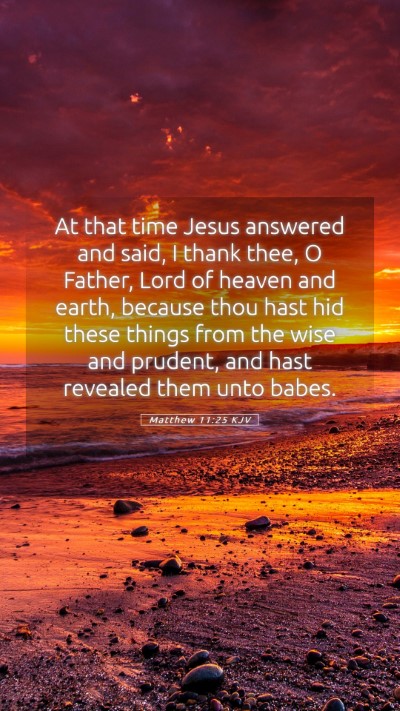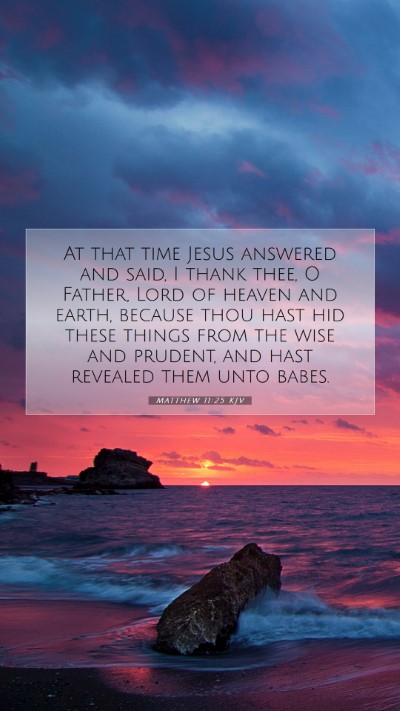Understanding Matthew 11:25
Matthew 11:25 states: "At that time Jesus said, 'I praise you, Father, Lord of heaven and earth, because you have hidden these things from the wise and learned, and revealed them to little children.'
This verse speaks to profound themes of divine revelation and the paradoxical wisdom of God. Here is a detailed exposition drawn from the insights of renowned public domain commentaries.
Contextual Background
This passage occurs during a period of intense teaching and miracles performed by Jesus. The surrounding verses illustrate the varied responses of the people to His ministry. Those who considered themselves wise and knowledgeable often rejected His message, while the humble embraced it.
Meaning and Analysis
This verse can be broken down into several key components, providing a rich understanding of its implications:
- Divine Praise: Jesus expresses gratitude to God, recognizing Him as Lord of heaven and earth. This acknowledgment underscores God's sovereignty and the rightful authority within the universe.
- Secret Wisdom: The phrase "hidden these things" suggests that divine truths are not accessible to everyone. This aligns with the idea that spiritual insight is a gift from God, rather than a product of human intellect.
- Revelation to the Humble: The contrast between the "wise and learned" and "little children" illustrates a recurring biblical theme: God often reveals His truths to the humble and innocent, as they are more receptive and open than the proud.
Commentary Insights
Matthew Henry's Commentary
Henry emphasizes the joy of Christ in revealing spiritual truths. He notes that the 'wise and learned' are those who rely on their own understanding and learning, while 'little children' symbolize those who approach God with simplicity and faith. This serves as a call to humility and child-like trust in divine wisdom.
Albert Barnes' Notes
Barnes points to the mysterious nature of God's revelation. He interprets 'hidden' as God's intentional choice to keep certain truths from the arrogant and learned, thus illustrating a divine paradox where human wisdom can blind one to the truth.
Adam Clarke's Commentary
Clarke expounds on the notion of ‘little children’ as a reference to those who are teachable and dependent. He sees this verse as an encouragement to those who may feel lesser or unworthy in society, highlighting that the kingdom of heaven belongs to such individuals.
Application in Daily Life
This verse invites reflection on how we approach knowledge and understanding in our spiritual lives:
- Humility: Recognizing our limitations and approaching God with a posture of humility can lead to deeper insights.
- Faith: Like children, maintaining a child-like faith can open our hearts to the lessons God wishes to impart.
- Awareness of Pride: Awareness of our pride can help us avoid the pitfalls of self-reliance that hinder our spiritual growth.
Cross References
- 1 Corinthians 1:19-21: "For it is written: 'I will destroy the wisdom of the wise; the intelligence of the intelligent I will frustrate.'
- Luke 10:21: "At that time Jesus, full of joy through the Holy Spirit, said, 'I praise you, Father, Lord of heaven and earth, because you have hidden these things from the wise and learned, and revealed them to little children.'
- James 4:6: "God opposes the proud but shows favor to the humble."
Conclusion
Matthew 11:25 encapsulates essential truths about humility, divine wisdom, and the nature of revelation. It challenges readers to examine their own hearts regarding pride and child-like faith as they seek deeper biblical understanding. This verse serves as a significant pillar in the broader context of Jesus' teachings, reinforcing crucial aspects of the Christian faith.
For those exploring Bible verse meanings or seeking Bible study insights, this verse exemplifies the beauty of God's revelation to those who approach Him with openness and humility. Engaging in in-depth Bible verse analysis such as this not only deepens one’s understanding of Scripture but also enriches one’s spiritual journey.


